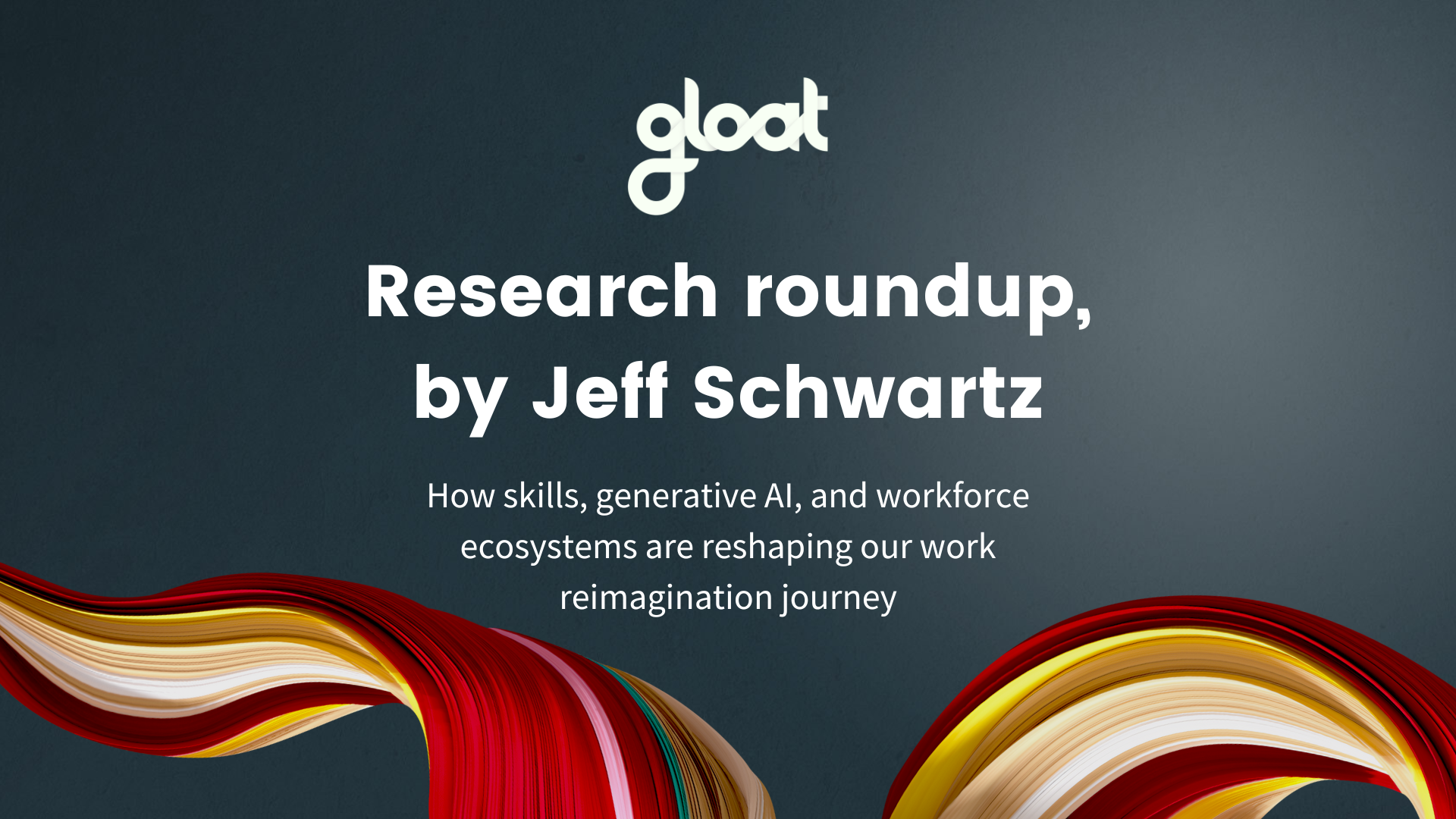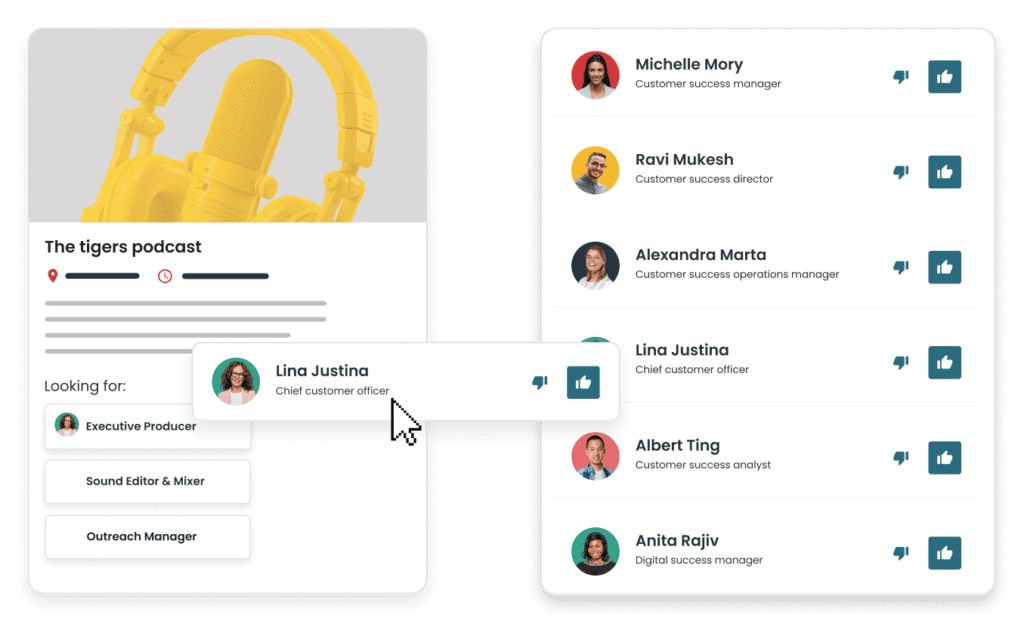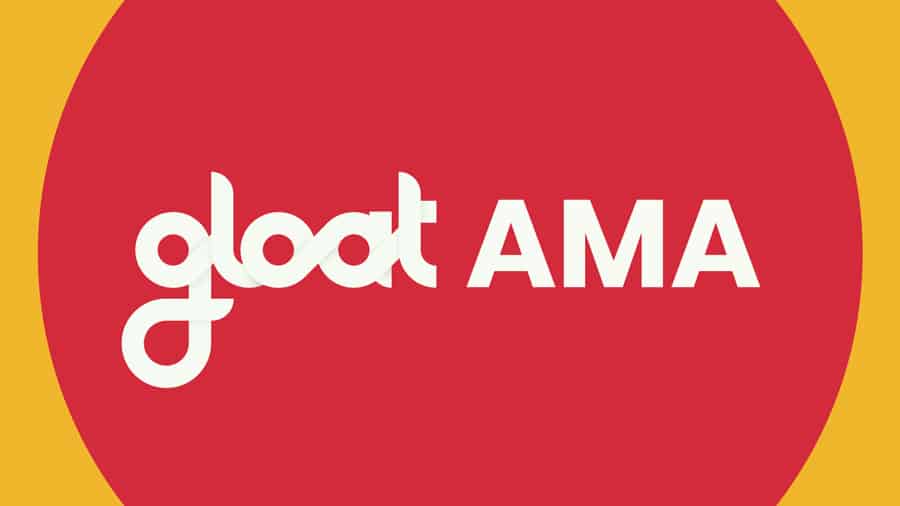April research roundup: How skills, generative AI, and workforce ecosystems are reshaping our work resignation journey
What I am reading, listening to, and thinking about in the world of talent marketplaces and skills

Much like the first years of the 2020s, 2023 continues to be a time of profound shifts in the way we work and drive impact. Amidst ongoing economic turbulence and widening skills shortages, leaders are looking to a new generation of technological innovations to unlock capacity, accelerate results, and empower employees—and workers of all types—to achieve their full potential.
ChatGPT is, of course, the breakthrough at the forefront of most leaders’ discussions right now. Across all industries, business functions, and seniority levels, employees and managers are experimenting with the technology and seeing how they can leverage it to augment and accelerate work.
The rise of generative AI—and AI-powered innovation at large—is further evidence that our working world is in a state of massive transformation and transition. We are rethinking operating models, not only to increase employees’ performance and productivity, but also to make room for human-machine collaborations that will usher in an era of unprecedented efficiency and enhanced outcomes.
As we stand with one foot in the past and one foot in this augmented future, it’s up to leaders to identify the role these new innovations will play in reshaping the way we work and prepare their employees accordingly. To help workforces get ready for the next wave of AI innovation, this month’s research roundup will be dedicated to exploring the rise of these technologies and the role they can play in creating better outcomes for employees, managers, customers, and societies.
Here are the pieces I am reading, listening to, and thinking about to put 2023’s rapid changes into context to pave the way for long-term success.
REFLECT: This month I’m adding two “classic’ pieces to begin the roundup. They provide some historical perspective on two of the major issues we’re facing in 2023: the role of machines as talent and the evolution of the open talent economy and workforce ecosystems
Machine as talent: collaboration, not competition, Deloitte, by David Schatsky and Jeff Schwartz: In the Deloitte Global Human Capital Trends Report 2015 we consider the future of cognitive technologies in HR and the questions business and HR should be asking. Among the findings we explored were the increasing power of computers and software to perform cognitive tasks and how organizations must rethink the design of work and employees’ capabilities. At the time, 6 out of 10 respondents to a global survey reported this trend (machines as talent) as important or very important, but fewer than 1 in 10 claimed to have an excellent understanding of its implications. The power and impact of AI on work and the workforce has been growing for years. I’m reminded of the quote, sometimes attributed to Mark Twain or F. Scott Fitzgerald: “At first you go bankrupt slowly, then all at once.” Sounds like the growing impact of AI on the workforce to me.
The Open Talent Economy: Beyond Corporate Borders to Talent Ecosystems, Deloitte, by Jeff Schwartz, Andrew Liakopoulos, Lisa Barry: In 2013, with several global partners at Deloitte Consulting, we introduced the onset of the shift from a focus on talent within companies to the open talent economy: the range of talent options from employees to contractors and, yes, machines. Well, after 10 years, this shift is now mainstream and with colleagues from MIT Sloan Management Review and Deloitte Consulting we released a book published by MIT Press: WORKFORCE ECOSYSTEMS: Reaching Strategic Goals with People, Partnerships and Technologies. Ten years in the making, this is one of the critical reframing opportunities for business and talent leaders in 2023 and beyond.
READ: What’s new in thought leadership about skills, talent marketplaces and the future of work
Gloat Unveils Skills Foundation: I need to start with the big announcement we made at Gloat last month when we introduced Skills Foundation, a set of AI-powered tools designed to help organizations navigate business transformation initiatives and look beyond job structures to become skills-based organizations. Gloat’s Skills Foundation is designed to help businesses identify and mitigate skill gaps and reskill and redeploy talent to better align workforces to business strategies at speed and scale. As we build the world’s leading workforce agility operating system, deepening our capabilities and access to internal and external data to help companies make dynamic decisions on skills and workforce planning are more timely and critical than ever.
Is AI Coming For Your Job, Harvard Business School, by Kristen Senz: An interesting article from five professors at Harvard Business School on AI’s impact on jobs. Here are my top takeaways from each:
- Joseph Fuller: Brace for massive workforce changes
- Ayelet Israeli: For now, AI still needs human intervention
- Iavor Bojinov: Those who resist AI risk falling behind
- Edward McFowland III: Skill sets will shift
- Tsedal Neeley: Companies and workers should focus on upskilling.
Ok. It’s clear now, right?
Engaged Employees Create Better Customer Experiences, Harvard Business Review, by Denise Lee Yohn: If leaders had any lingering doubts about the importance of delivering a compelling employee experience, this Harvard Business Review article will put those to rest. Denise Lee Yohn spotlights some eye-opening insights, including research from PwC that found that companies that invest in superior consumer and employee experiences can charge a premium of 16% for their products and services and MIT’s finding that companies in the top quartile of EX develop more successful innovations, deriving twice the amount of revenue as those in the bottom quartile did.
Why Is The World Afraid Of AI? The Fears Are Unfounded, And Here’s Why., JoshBersin.com, by Josh Bersin: As we strive to separate AI facts from AI fiction, Josh Bersin continues to provide leaders with the insights they need to leverage these game-changing technological innovations. In this piece, he breaks down the five most common fears he hears in the context of AI, including concerns about it eliminating jobs, accelerating inequalities, and creating misinformation. He discusses what makes these misconceptions untrue and shares some helpful guidance for leaders who are interested in seeing what AI-powered tools are all about.
We Don’t Know What Will Happen Next, The New York Times, by Jerome Roos: By now, most leaders recognize that we’re at a critical crossroads. In his New York Times op-ed Jerome Roos explores this idea further, noting that we’re currently in a period of radical uncertainty, or what anthropologists call liminality—the sense of disorientation that arises during a rite of passage. While such profound transitions can be challenging, I encourage everyone to see this opportunity for what it is: a chance to fundamentally reimagine the way work gets done to build brighter and more sustainable futures.
The World of Generative AI, Medium, by John Winsor: I couldn’t agree more with John Winsor’s analysis on how generative AI will transform human resources and talent strategies. In his words, “Ultimately the future of HR will be shaped by those who can combine the best of both worlds—leveraging technology to drive efficiency while also embracing new ways of working that put outcomes first.” This is a thoughtful synthesis of insights from Josh Bersin and Balaji Bondili that I highly recommend all leaders read as the pace of AI innovation keeps accelerating.
LISTEN: What I’ve been playing on repeat
Point-of-work transactions: How Mastercard connects its employees with opportunities, HBS Managing the Future of Work, with Ben Reuveni and Michael Fraccaro: If you’re looking to learn more about what goes into launching a talent marketplace and the transformational changes the platform sets into motion, think of this podcast as required listening. It’s a conversation between Gloat’s CEO Ben Reuveni and Mastercard’s CHRO Michael Fraccaro. During the episode they discuss the best practices that Mastercard is harnessing to reimagine career development and empower employees to achieve their full potential.
Who Is Your Workforce: Past, Present & Future, Ecosystemic Futures, with Liz Altman and Jeff Schwartz: We all know that the working world is profoundly changing. What’s less clear is how our operating models and business practices must evolve to keep pace—which is exactly what Liz Altman and I discuss in this podcast episode with Dyan Finkhousen and her co-host Vik Shyam. We share some of the key findings from our book, WORKFORCE ECOSYSTEMS, and explore how people and technologies can work together in new ways to create value and drive impact. If you’re interested in learning more about the topics we cover in the podcast episode, check out our book and thanks to my co-authors Elizabeth Altman at the Manning School of Business at UMass Lowell, David Kiron at MIT Sloan Management Review, and Robin Jones at Deloitte Consulting.
Exactly How Does ChatGPT Work (and How Worried Should We Be?), with Cal Newport: Cal Newport, an author and professor of Computer Science at Georgetown University, has a recent Youtube Video (link above), podcast (Thoughts on ChatGPT) and article in the New Yorker: What Kind of Mind Does ChatGPT Have?. All of these pieces explain, as only Cal Newport can, how ChatGPT works. Pick your content style (watching, listening, or reading) but it’s definitely worth taking some time to understand how ChatGPT works as we’re all trying to figure out what to do about it.
THINK: What research and studies are saying about our path forward
How will ChatGPT change the way we think and work? Stanford scholar examines, Stanford News, by Melissa de Witte: This is a fascinating interview with Jeff Hancock at Stanford University that discusses how generative AI will shape the way we communicate, as well as some predictions about the future of human-machine collaborations. In Hancock’s words, “We will find ways of using AI-mediated communication as a tool. I think the more we think of it as an assistant or a tool that is incredibly powerful, the more we can envision how it will be useful.” He goes on to remind us that while these systems are rapidly advancing, they aren’t ready to plug and play off the shelf just yet. A lot of work is required as we rethink work, jobs, projects, and tasks to combine people and ChatGPT to create value for workers, customers, and society.
Gloat Supports Organizations Through Transition to Talent Transformation, 3Sixty Insights, by Jennifer Dole: This report by the leading research firm 3Sixty Insights explores how companies across multiple industries are harnessing talent marketplaces to achieve impressive results on accelerated timelines. After speaking with executives at companies in the energy, insurance, and pharmaceutical industries, Jennifer Dole recaps the journey these organizations go on to implement their platforms as well as some of the transformational changes they’ve achieved post-launch.
CONNECT: What future-fit organizations and leaders are talking about
Tanuj Kapilashrami, LinkedIn: While ChatGPT may be dominating conversations right now, it’s not the only AI-powered innovation that leaders should have on their radar. As Tanuj Kapilashrami explains in her LinkedIn post, an AI-enabled talent marketplace is another key technological breakthrough that will revolutionize the way we work. She details some of the results Standard Chartered Bank’s platform is achieving, including the fact that over 77,000 employees are counted as users and that there are more than 1,500 projects on the platform.






